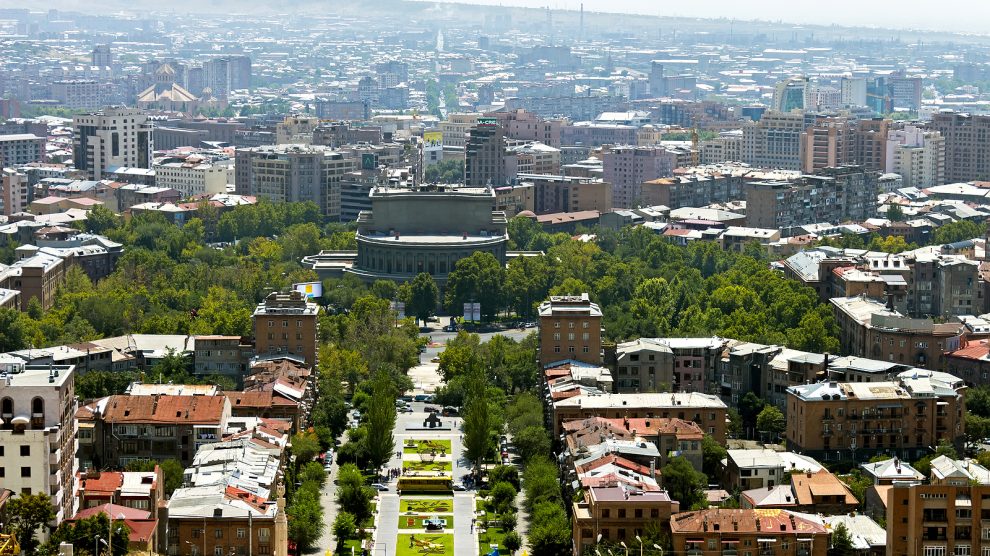Three decades of conflict, ethnic cleansing, and border disputes are over for Armenia and Azerbaijan, as 2024 will be a breakthrough year for Armenia’s relations with both its Turkish and Azerbaijani neighbours. It’s been a long time coming.
From 1988 to 1992, Armenia and Azerbaijan were embroiled in the bloodiest conflict among the fifteen Soviet republics. Armenia, with Soviet and Russian military assistance, defeated Azerbaijan and occupied a fifth of its territory. Armenian nationalists declared this territory to be ‘reunited’ in perpetuity in their dream of a greater Armenia (miatsum).
Three decades of UN resolutions, mediation by the OSCE Minsk Group and involvement of the US, France and Russia failed to achieve any change in this situation and breakthrough to peace. This frozen conflict was only unfrozen in 2020 when Azerbaijan won a 44-day war and re-took most of its occupied territory.
Last year, Azerbaijan completed the process of re-taking its territory when it removed Armenian control over Karabakh in a one-day war.
- Central Asia and the South Caucasus are well set for relatively high levels of growth in 2024
- Azerbaijan: Caucasus pivot and Europe’s bridge to Central Asia
- The soul of Armenia: Five essential reads
These two short wars returned Armenia and Azerbaijan to the common boundary that had existed within the Soviet Union from 1922-1988; that is up to the launch of the First Karabakh War. With the signing of a peace treaty this former Soviet boundary will become the international border between two independent states. Armenia and Azerbaijan would then open full diplomatic relations.
Unfortunately, the conflict in Georgia remains frozen. After Russia invaded Georgia in the summer of 2008, the Kremlin recognised the so-called ‘independence’ of South Ossetia and Abkhazia. Russia’s invasion and blatant violation of Georgian sovereignty was undertaken by President Dmitri Medvedev whom Western governments wrongly dubbed a ‘liberal’.
Medvedev was never was a liberal. As the deputy head of Russia’s Security Council he is one of the most hawkish of Russian leaders in his vitriolic demands for aggressive military action in the Kremlin’s war against Ukraine and use of nuclear weapons against Western countries and NATO.
Bringing an end to Russia’s ‘peacekeeping’ missions
Turkey closed its border with Armenia in 1992 at the end of the First Karabakh War. Negotiations towards what has been called the ‘normalisation’ of relations between Turkey and Armenia have been taking place for the past decade. But these could only hope to have a breakthrough after a peace treaty will be signed between Azerbaijan and Armenia. The opening of the border between Turkey and Armenia would be followed by the establishment of full diplomatic relations.
As the Washington think tank Brookings Institution wrote, “For Turkey and Armenia, normalisation and reconciliation can be seen as two sides of the same coin.” Reconciliation primarily refers to the Armenian genocide committed in 1915 by the Ottoman Empire, eight years before the founding of the modern Turkish nation-state. The coming to power of Nikol Pashinyan in the 2018 popular Armenian revolution removed the pro-Russian ‘Karabakh clan’ and made normalisation and reconciliation with Turkey more likely.
Next year, 2025, will be the last year of Russia’s so-called ‘peacekeeping’ presence in the Karabakh region. Since the disintegration of the USSR in 1991, Russia has used its ‘peacekeeping’ forces to maintain a permanent sphere of influence over Eurasia. The Kremlin manufactured frozen conflicts in Moldova, Georgia and Azerbaijan and never had an interest in resolving them because Russian ‘peacekeepers’ would then be longer required.
Russia, Armenia, and Azerbaijan signed a ceasefire agreement at the end of the Second Karabakh War in November 2020 which introduced Russian ‘peacekeepers’ for a five-year period. Russia’s so-called ‘peacekeepers’ were criticised by both Yerevan and Baku for their passivity and they became redundant after Azerbaijan’s liberation of Karabakh. In November of next year, Azerbaijan and Armenia will not renew the five-year mandate and Russian ‘peacekeepers’ will be forced to withdraw, the first example of a Russian pull-out in Eurasia.
The benefits of peace
A new era of peaceful relations with Armenia’s bigger neighbours, Azerbaijan and Turkey, will bring important benefits. Peace will provide Armenia with the ability to manoeuvre from a pro-Russian to a more balanced, multi-vector foreign and security policy. Increased trade and energy ties with its neighbours will vastly improve Armenia’s economic prospects and encourage many of the over two million migrants in Russia to return home.
A breakthrough in peace in the South Caucasus, coupled with a potential Russian military defeat in Ukraine, would provide pro-Western Pashinyan with the ability to re-orientate Armenia away from Russia and Eurasia to Europe.
Armenia could begin the process of ‘Armexit’ of its membership from the Eurasian Economic Union and re-join the path, dropped a decade ago, of signing an Association Agreement with the EU. Further down the road, Armenia could join Ukraine, Georgia, and Moldova in receiving candidate EU candidate status.
Peaceful relations between Armenia, Azerbaijan, and Turkey are good for Western strategic interests, the EU, and US, and bad for Russia and Iran who have promoted instability. Peace in the South Caucasus stands in sharp contrast to the growing conflagration in the Middle East.
Unlike many news and information platforms, Emerging Europe is free to read, and always will be. There is no paywall here. We are independent, not affiliated with nor representing any political party or business organisation. We want the very best for emerging Europe, nothing more, nothing less. Your support will help us continue to spread the word about this amazing region.
You can contribute here. Thank you.







Add Comment